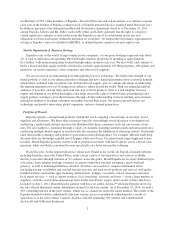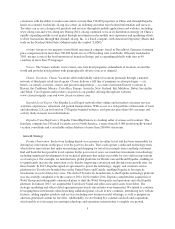Expedia 2014 Annual Report Download - page 17
Download and view the complete annual report
Please find page 17 of the 2014 Expedia annual report below. You can navigate through the pages in the report by either clicking on the pages listed below, or by using the keyword search tool below to find specific information within the annual report.Corporate travel management service providers: Egencia, our full-service corporate travel management
company, competes with online and traditional corporate travel providers, including Carlson Wagonlit and
American Express, as well as vendors of corporate travel and expense management software and services,
including Concur. Some of these competitors may have more financial resources, greater name recognition, well-
established client bases, differentiated business models, or a broader global presence, which may make it difficult
for us to retain or attract new corporate travel clients.
Mobile platform travel applications: Mobile platforms, including smartphones and tablet computers, have
rapidly emerged and continue to grow significantly. The emergence and improved functionality of mobile
platforms has led to an increased use by consumers of standalone applications to research and book travel. If we
are unable to offer innovative, user-friendly, feature-rich mobile applications for our travel services, along with
effective marketing and advertising, or if our mobile applications are not used by consumers, we could lose
market share to existing competitors or new entrants and our future growth and results of operations could be
adversely affected.
Social media websites: Social media websites, including Facebook, continue to develop search functionality
for data included within their websites and mobile applications, which may in the future develop into an
alternative research and booking resource for travelers, resulting in additional competition.
Other participants in the travel industry: Traditional consumer eCommerce websites, such as Amazon, and
group buying websites, such as Groupon, have been expanding their local offerings into the travel market by
adding hotel offers to their sites. To the extent such websites continue to expand these services over time, it may
create additional competition. In addition, AirBnB, HomeAway, and similar websites facilitate the short-term
rental of homes and apartments from owners, thereby providing an alternative to hotel rooms. The continued
growth of peer-to-peer inventory sources could affect the demand for our services in facilitating reservations at
hotels.
We cannot assure you that we will be able to compete successfully against any current, emerging and future
competitors or on platforms that may emerge, or provide differentiated products and services to our traveler base.
Increasing competition from current and emerging competitors, the introduction of new technologies and the
continued expansion of existing technologies, such as metasearch and other search engine technologies, may
force us to make changes to our business models, which could affect our financial performance and liquidity. In
addition, competitive pressure is particularly acute in China, where we operate primarily through our majority-
owned subsidiary, eLong. In an effort to compete effectively, eLong is increasing levels of investment in
marketing, mobile product, technology and supply development as well as engaging in discounting and
couponing activity, which has had, and is expected to continue to have at increasing rates, an adverse effect on
eLong’s financial condition and operating results.
In general, increased competition has resulted in and may continue to result in reduced margins, as well as
loss of travelers, transactions and brand recognition.
The industry in which we operate is dynamic.
We continue to adapt our business to remain competitive, including investing in emerging channels such as
metasearch, developing products for new platforms such as mobile, offering new consumer choices such as our
ETP program, and increasing supplier inventory on our existing platforms through acquisitions and partnerships.
If we fail to appropriately adapt to competitive or consumer preference developments, our business could be
adversely affected. Our attempts to adapt our current business models or practices or adopt new business models
and practices in order to compete, may involve significant risks and uncertainties, including distraction of
management from current operations, expenses associated with the initiatives, inadequate return on investments,
difficulties and expenses associated with the integration of the inventory of acquired brands onto our platforms,
as well as limiting our ability to develop new site innovations. In addition, adaptations to our business may
13
























